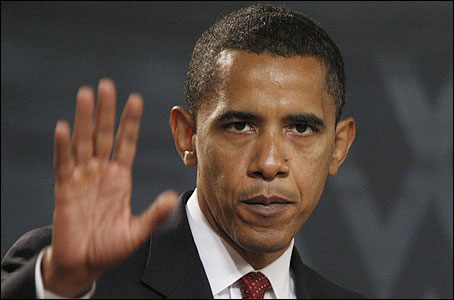Obama won't lift embargo on Cuba
 Washington - Presidential hopeful Barack Obama said Friday he would not begin lifting the economic embargo on Cuba until the communist island began taking initiatives to end oppression and move toward free elections.
Washington - Presidential hopeful Barack Obama said Friday he would not begin lifting the economic embargo on Cuba until the communist island began taking initiatives to end oppression and move toward free elections.
Instead, Obama said he would ease it on a case by case basis if Cuba showed signs of democratic change and released the more than 200 political prisoners.
"I will maintain the embargo," Obama told a gathering in Miami. "It provides us with the leverage to present the regime with a clear choice."
Obama came under heavy criticism from the presumptive Republican nominee, John McCain, who accused the leading Democratic candidate of taking a soft position toward the regime dominated by the Castro brothers.
But Obama stuck by his pledge to hold unconditional talks with Cuban leader Raul Castro, but only after "careful preparation" and a "a clear agenda" that would help ensure discussion would produce real reforms in Cuba.
"As president I would be willing to lead the diplomacy at a time and place of my choosing," Obama said, accusing McCain of distorting his position.
McCain has adopted the policy of the Bush administration, which refuses to hold talks with Cuba until democratic reforms are enacted that allow for freedom of the press, free elections and all political prisoners are released.
McCain said at a campaign rally Monday in Miami, home to large Cuban American population which prefers a hardline stance on the regime, that talks with Castro would embolden the regime.
"These steps would send the worst possible signal to Cuba's dictators - there is no need to undertake fundamental reforms, they can simply wait for a unilateral change in US policy," McCain said Tuesday.
Obama said he would ease rules that restrict that amount of money Cuban-Americans are permitted to send back to their families, restrictions that were tightened by the Bush administration.
Obama accused McCain of seeking to prolong a Bush administration approach toward Latin America that has harmed the image of the United States throughout the region and aided US foes like Venezuelan President Hugo Chavez.
"Instead of engaging the people of the region we've acted like we can still dictate terms unilaterally," Obama said.
He said the Bush administration's "clumsy attempts" to undermine Chavez's influence in South America has only strenghened his hand.
But Obama also faulted Chavez of degrading democratic institutions in the country, and his White House would not tolerate Venezuela's alleged support for FARC rebels in Colombia.
"We will shed a light on any support that comes from, neighbouring governments," Obama said.
The United States has long suspected that Chavez has aided FARC, a group of leftist rebels which has waged a bloody civil war in Colombia and is heavily involved in the drug trade.
The Colombian military carried out in airstrike in Ecuador in March against a FARC camp that successfully killed one of its top leaders, Raul Reyes.
The Colombians seized Reyes laptop which reportedly contains information showing that the Chavez government has provided assistance to FARC, which stands for the Revolutionary Armed Forces of Colombia. (dpa)